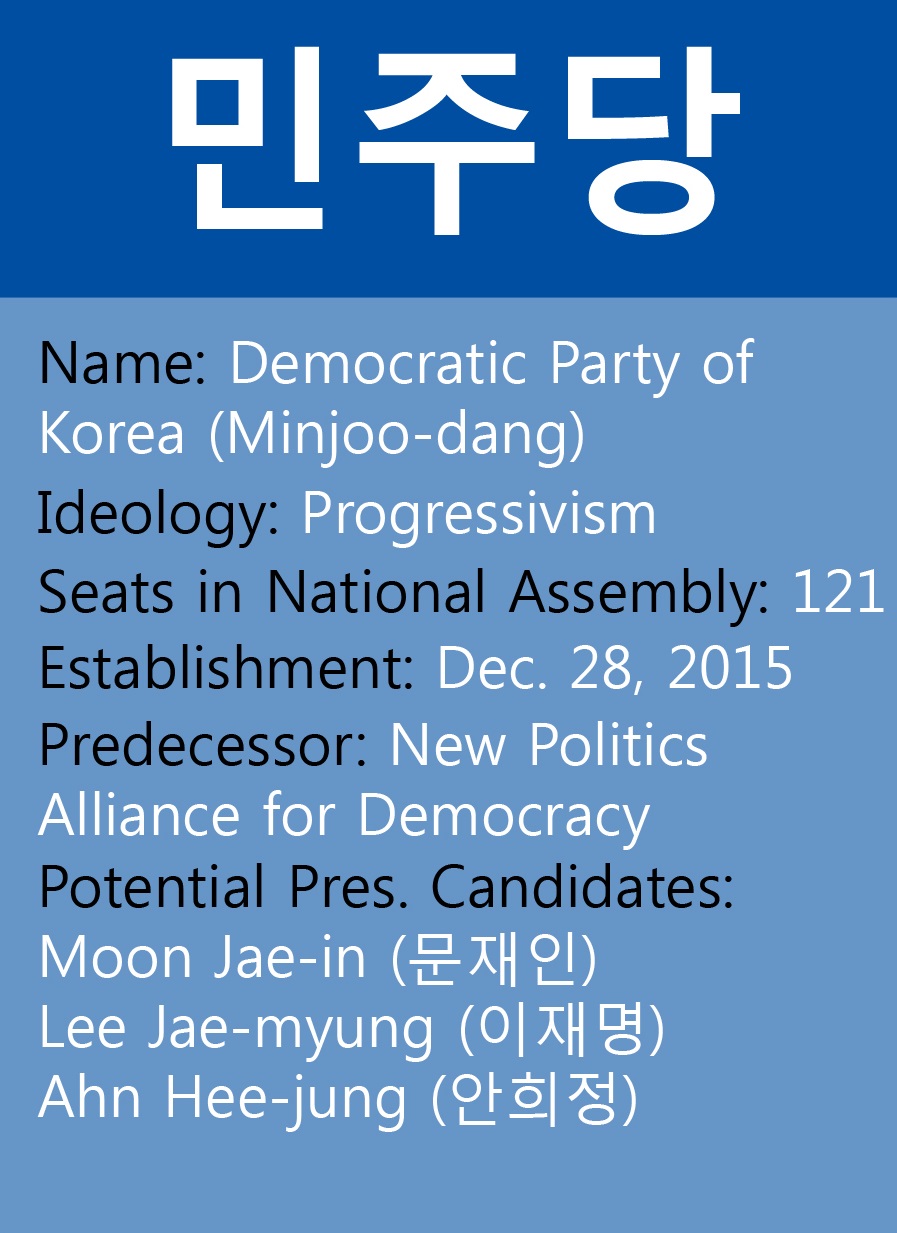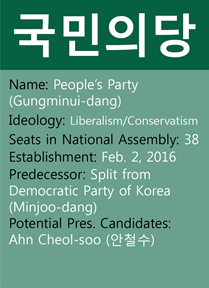The Peninsula
South Korea’s Political Parties: Bareun Makes its Case

By Junil Kim
The official establishment of South Korea’s newest political party, the Bareun (Righteous) Party, brings the number of official negotiation parties in the National Assembly to four. The party, comprised of former Saenuri legislators, broke away from the ruling party in light of the political fallout from President Park Geun-hye’s recent scandal and subsequent impeachment. Unlike the U.S.’s dominant two-party system, the rotating cycle of splintering, merging, and forming of political parties has been a hallmark South Korean politics in the modern democratic era.
With a potential early presidential election, the major South Korean political parties are short on time to consolidate their bases and put together campaigns for their potential candidates. A number of politicians have already announced their bids, and more are expected to in the weeks ahead. Former UN Secretary General Ban Ki-moon, a strong contender for the presidency, has not yet formally announced his presidential bid or aligned himself with a party, but his eventual decision is likely to have significant implications on the future state of South Korea’s political parties.
Here is a brief look at the current state of the four major political parties in South Korea today.
Bareun Party
 Despite being the newest political party in South Korea, the Bareun Party is already the 4th largest with 30 National Assembly members that have defected from the ruling Saenuri Party. In seeking to distance itself from the corruption charges of the Park scandal, the Bareun Party has branded itself as center-right and an advocate of “clean and warm” conservatism.
Despite being the newest political party in South Korea, the Bareun Party is already the 4th largest with 30 National Assembly members that have defected from the ruling Saenuri Party. In seeking to distance itself from the corruption charges of the Park scandal, the Bareun Party has branded itself as center-right and an advocate of “clean and warm” conservatism.
The Bareun Party’s hopes to expand their political influence are largely tied to successfully courting Ban Ki-moon, a self-described “progressive conservative,” to their party. The political clout the former UN secretary general would bring to the newly formed part would be substantive, and the most recent Realmeter poll shows him as the second most popular potential presidential candidate behind potential Minjoo candidate Moon Jae-in. Regardless of Ban’s eventual decision, the Bareun Party already has two presidential hopefuls in Yoo Seong-min and Nam Kyung-pil, the latter of which has announced his bid.
Minjoo Party
 The Minjoo Party, which has not held the presidency since 2008, currently holds the most seats in the National Assembly at 121. The strong turnout from last year’s National Assembly election and enormous popular protests against Park Geun-hye in November and December have emboldened progressive legislators ahead of the presidential election. According to a recent Gallup Korea poll, the Minjoo Party currently boasts the highest approval rating of South Korea’s political parties at 37%.
The Minjoo Party, which has not held the presidency since 2008, currently holds the most seats in the National Assembly at 121. The strong turnout from last year’s National Assembly election and enormous popular protests against Park Geun-hye in November and December have emboldened progressive legislators ahead of the presidential election. According to a recent Gallup Korea poll, the Minjoo Party currently boasts the highest approval rating of South Korea’s political parties at 37%.
Former Minjoo chairman Moon Jae-in, who previously ran against Park Geun-hye in the 2012 general election, remains the frontrunner presidential candidate for the Minjoo Party. The most recent polls show him as the most popular presidential choice with an increased approval rating of 29.1%, which is nearly 10 points over Ban Ki-moon’s runner-up rating of 19.8%. Fellow Minjoo politician Lee Jae-myung is the third most popular choice with a rating of 10.1%.
People’s Party
 Ahn Cheol-soo, the former chairperson of the then New Politics Alliance for Democracy, co-founded the People’s Party early last year after a falling out with Moon Jae-in. The minor center-left party garnered 38 seats in last year’s legislative elections, which helped form a progressive plurality with the Minjoo Party in the National Assembly. Since its creation, the party has dealt with its own corruption scandal that led to the resignation of Ahn from the party leadership.
Ahn Cheol-soo, the former chairperson of the then New Politics Alliance for Democracy, co-founded the People’s Party early last year after a falling out with Moon Jae-in. The minor center-left party garnered 38 seats in last year’s legislative elections, which helped form a progressive plurality with the Minjoo Party in the National Assembly. Since its creation, the party has dealt with its own corruption scandal that led to the resignation of Ahn from the party leadership.
The People’s Party also remains an option for Ban Ki-moon, though party leadership in the past week has stated that Ban has “drifted too far away” from the People’s Party. Ahn Cheol-soo has also fervently lobbied for his own presidential campaign, and currently holds a 7.4% approval rating.
Saenuri Party
 This past year has not been kind to the conservative Saenuri Party, which failed to maintain its legislative majority in elections last April and suffered major political blowback from the presidential scandal. The ruling party had previously enjoyed a majority in the National Assembly since 2008 and two successive presidents (Lee Myung-bak and Park Geun-hye). The creation of the Bareun Party was a further blow to the Saenuri Party, and the risk of additional defectors threatens to continue to weaken the party’s political presence. In addition to the initial Bareun defectors, other Saenuri politicians have already indicated their willingness to join the splinter group, including Saenuri Rep. Park Soon-ja, who announced on Monday that she would be leaving the party.
This past year has not been kind to the conservative Saenuri Party, which failed to maintain its legislative majority in elections last April and suffered major political blowback from the presidential scandal. The ruling party had previously enjoyed a majority in the National Assembly since 2008 and two successive presidents (Lee Myung-bak and Park Geun-hye). The creation of the Bareun Party was a further blow to the Saenuri Party, and the risk of additional defectors threatens to continue to weaken the party’s political presence. In addition to the initial Bareun defectors, other Saenuri politicians have already indicated their willingness to join the splinter group, including Saenuri Rep. Park Soon-ja, who announced on Monday that she would be leaving the party.
Although the Saenuri Party made efforts to bring Ban Ki-moon to their party, he has made public statements distancing himself from the party and the Park scandal. If he decides to join the Bareun party, more Saenuri legislators from Seoul and Ban’s native Chungcheong province may join him. Still, the party is likely to have other presidential candidates, including former Saenuri legislator Rhee In-je, who has already announced his bid, and Saenuri floor leader Won Yoo-chul.
Juni Kim is the Program Manager and Executive Assistant at the Korea Economic Institute of America (KEI). Jennifer Cho and Patrick Niceforo, interns at the KEI also contributed to this blog. The views expressed here are the author’s alone.
*An earlier image showed Park Won-soon as a potential presidential candidate for the Minjoo Party. He withdrew his bid on January 26th.
Photo from the Republic of Korea’s photostream on flickr Creative Commons.
